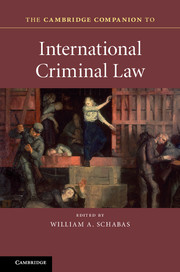Book contents
- Frontmatter
- Dedication
- Contents
- List of contributors
- List of abbreviations
- Introduction
- PART I PURPOSES AND PRINCIPLES
- PART II INSTITUTIONS
- PART III CRIMES
- 10 Atrocity crimes (genocide, crimes against humanity and war crimes)
- 11 Treaty crimes
- 12 Criminalising the illegal use of force
- 13 Children
- PART IV TRIALS
- PART V THE FUTURE
- Index
- References
10 - Atrocity crimes (genocide, crimes against humanity and war crimes)
from PART III - CRIMES
Published online by Cambridge University Press: 05 December 2015
- Frontmatter
- Dedication
- Contents
- List of contributors
- List of abbreviations
- Introduction
- PART I PURPOSES AND PRINCIPLES
- PART II INSTITUTIONS
- PART III CRIMES
- 10 Atrocity crimes (genocide, crimes against humanity and war crimes)
- 11 Treaty crimes
- 12 Criminalising the illegal use of force
- 13 Children
- PART IV TRIALS
- PART V THE FUTURE
- Index
- References
Summary
The expression ‘atrocity crimes’, apparently first proposed by David Scheffer, and subsequently adopted by the Special Advisers to the United Nations Secretary-General on the Prevention of Genocide and on the Responsibility to Protect, has emerged in recent years as shorthand for the offences that comprise the common denominator of the subject matter jurisdiction of the modern international criminal tribunals: genocide, crimes against humanity, and war crimes. Since the modern generation of international criminal courts and tribunals began activity in the mid 1990s, essentially all of the prosecutions have been for genocide, crimes against humanity, and war crimes. Exceptionally, the prosecutions at the Special Tribunal for Lebanon are for terrorist crimes under Lebanese law. The Special Court for Sierra Leone was able to exercise jurisdiction over some serious offences in the criminal law of Sierra Leone but the Prosecutor never sought indictments under the relevant provisions. And, soon, the International Criminal Court will be able to deal with the crime of aggression, a subject discussed in the chapter in this book by Benjamin and Donald Ferencz. All of the tribunals also have jurisdiction over offences related to their own operations, in particular perjury and contempt of court.
The Oxford English Dictionary defines ‘atrocity’ as ‘[a]n atrocious deed; an act of extreme cruelty or heinousness’, offering Thomas Jefferson as the historical example of its first use: ‘To defend themselves from the atrocities of a vastly more numerous and powerful people.’ Jefferson was justifying the young American government's provision of weapons to aboriginal peoples in Florida in order to protect themselves from Spanish colonialists. The association with this early manifestation of ‘humanitarian intervention’ is intriguing because ‘atrocity crimes’ are the unifying principle of the modern doctrine of the responsibility to protect, defined by the United Nations General Assembly in 2005.
In international law, the tripartite classification of genocide, crimes against humanity, and war crimes can be traced to the First World War. On 24 May 1915, the United Kingdom, France, and Russia informed the Ottoman rulers of reports of ‘these new crimes of Turkey against humanity and civilisation’. This was the first use of the term ‘crime against humanity’ in an official context although it had been employed by writers since the middle of the eighteenth century.
- Type
- Chapter
- Information
- The Cambridge Companion to International Criminal Law , pp. 199 - 213Publisher: Cambridge University PressPrint publication year: 2016
References
- 4
- Cited by

